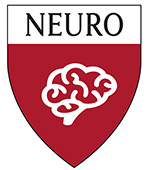Neuroscience is consistently in the top ten most popular concentrations for Harvard undergraduates, a phenomenon Ryan Draft, Assistant Director of Undergraduate Studies, Neuroscience and advisor to class of ’25, attributes to the increasing awareness of how the subject touches many different areas of life.
“What impresses me is how much neuroscience is in the news and how much attention it garners from people who work outside of the field,” he says. “Every time I open the news, I see articles about new neuroscience technologies or new promising drugs to treat diseases like Alzheimer’s, or read about artificial intelligence and connections with the brain. It’s relevant to so many other disciplines and to all our lives.”
The concentration, administered by the Department of Molecular and Cellular Biology (MCB), offers tracks for every neuroscientific interest. And it gives students access to world-class staff and faculty to help guide them through their education and into their careers.
“I am really happy at the level of interest in Neuroscience among the undergraduates. The success of our concentration is, to a great degree, the result of the deep commitment of Ryan Draft, Laura Magnotti, and now, Kristina Penikis. I, and the rest of the neuro-related faculty, are extremely grateful for their dedication to making this education mission so successful,” says Jeff Lichtman, Jeremy R. Knowles Professor of Molecular and Cellular Biology and head tutor of the Neuroscience concentration.
The Neuroscience concentration began in 2006 with the neurobiology track (which focuses on traditional biology-based coursework) and Mind Brain Behavior (MBB) (which gives students a neurobiological homebase for an interdisciplinary approach to studying the brain).
“The neurobiology track is what most people think of when they think of neuroscience, getting at the cells and circuits that underlie behavior,” says Draft. “Students on the MBB track supplement their neurobiology classes with courses from departments that are studying the mind, but taking very different approaches than neuroscience typically takes. Philosophy is a great example where people are working to understand consciousness and free will and human behavior, but they’re using a different approach and framing questions differently to come up with different insights.”
A computational neuroscience track was added in 2017 by then-head tutor Venki Murthy, catered to students interested in marrying computer science, statistics, and big data processing with questions of neuroscience.
“There’s always going to be some analysis given that we’re working with huge data,” says Draft. “Murthy wanted to create a space for students who had this interest to get trained within our program so they didn’t feel like they had to be in CSS or statistics and figure out how to get some biology in their life. And since then, we’ve seen an explosion of applications of neuroscience to non-biological, computer-heavy fields such as artificial intelligence.”
Kristina Penikis, the newest member of the Neuroscience Concentration Advising team, will be guiding the class of ’26 and will teach Neuro 120—Introductory Computational Neuroscience, a flagship course that will give students a strong foundation in this track during spring of their sophomore year.
“This subfield of neuroscience is often intimidating to students even at the graduate level, yet it represents an increasingly valuable skill set,” says Penikis. “With the course, I want to create an opportunity for undergraduate students to explore these tools early in their careers, and – hopefully – realize that they can integrate similar methods into future endeavors, whether in neuroscience research or a career outside of academia.”
Draft and Laura Magnotti, Assistant Director of Undergraduate Studies, Neuroscience and advisor to the class of ’24 and ‘27, also teach classes alongside their advising duties.
“I teach Neuro 115 – the Cellular Basis of Neural Function. It’s a course on physiology, trying to understand how cells are electrically active and how they use that, how they integrate that electrical activity with the molecular biology inside the cell to use that type of information to alter their response to the world they live in,” says Draft.
Magnotti’s course, Neuro 170—Brain Invaders, focuses on how pathogens infect the brain and affect health and behavior.
“In this course, students learn about a variety of infectious agents that have evolved a way to evade the brain’s defenses and either cause disease or simply change the behavior of their host to promote their own survival,” says Magnotti. “Then, students are challenged to consider whether any of the mechanisms used by these pathogens could be replicated in the lab or the clinic to develop new therapeutic approaches for neurological diseases, which have been historically very difficult to treat in part due to the challenge of getting drugs into the brain.
Students coming out of the Neuroscience concentration have myriad job opportunities open to them.
“I think our head tutor, Jeff Lichtman, would probably argue that knowing something about how the brain works and the biological constraints on behavior is really informative regardless of which field you go into,” says Draft. “You can see how it can influence your thinking in all areas of life, health, family, raising a child, thinking about how other people behave and consume or interact in the workplace.”
This broad applicability is why the department has continued the tradition of keeping the introductory course, Neuro 80, as accessible as possible to majors and non-majors alike.
“It’s a gateway to get people in the door of neuroscience who otherwise wouldn’t have thought about it,” says Draft. “And when they take it they realize ‘this is something I can do, and something I like’ and they might not become a concentrator, but they might take another class or do a minor, or they’ll just take that knowledge with them and use it for whatever problems they encounter in the future.”



